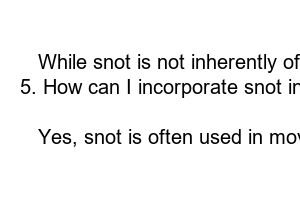코딱지가 자주 생기는 이유
**Why Does Snot Often Occur in English: A Detailed Explanation**
Have you ever wondered why **snot** seems to occur so frequently in the English language? Well, wonder no more! In this blog post, we will explore the reasons behind this common occurrence and shed some light on this interesting linguistic phenomenon.
**What is Snot and Why is it Used in English?**
Snot is a slang term that is often used to describe mucus that comes out of the nose. In English, snot is used to convey a sense of disgust or contempt towards something or someone. It is a versatile term that can be used in a variety of contexts to express negative feelings or thoughts.
**The Origins of Snot in English**
The use of snot in the English language can be traced back to Old English, where it was used to refer to the nasal mucus of humans and animals. Over time, snot has evolved to become a common slang term that is used to convey disdain or disdain towards something.
**Common Phrases and Expressions Involving Snot**
There are a number of common phrases and expressions in English that involve the use of snot. Some examples include “snotty attitude,” “snotty remarks,” and “a snotty look.” These phrases are often used to describe someone who is acting in a rude or disrespectful manner.
**The Role of Snot in Pop Culture**
Snot is a popular term in pop culture, often used in movies, television shows, and music. It is often used to add humor or emphasis to a particular scene or situation. Snot can also be used as a form of comic relief in various forms of entertainment.
**Why Does Snot Resonate with English Speakers?**
Snot resonates with English speakers because it is a simple yet effective way to express negative emotions. It is a versatile term that can be used in a variety of contexts, making it a popular choice for many people.
**In Conclusion**
In conclusion, snot is a common occurrence in the English language due to its versatility and ability to convey negative emotions. Whether used in everyday conversation or in popular culture, snot continues to be a popular term that resonates with English speakers.
**Summary**
In this blog post, we explored the reasons why snot often occurs in the English language. We discussed the origins of snot, common phrases and expressions involving snot, its role in pop culture, and why it resonates with English speakers. Ultimately, snot is a versatile term that is used to express disgust, contempt, or disdain towards something or someone. Its popularity in the English language can be attributed to its simplicity and effectiveness in conveying negative emotions.
**FAQs**
1. Is snot a formal term in the English language?
No, snot is considered a slang term and is not typically used in formal settings.
2. Can snot be used in a positive context?
While it is rare, snot can be used in a humorous or ironic way in some contexts.
3. Are there any other languages that use the term snot?
Snot is primarily used in the English language and may not have direct translations in other languages.
4. Is snot offensive to some people?
While snot is not inherently offensive, it may be considered rude or disrespectful in certain situations.
5. How can I incorporate snot into my everyday speech?
You can use snot in a playful or casual manner when expressing negative emotions or feelings towards something.
6. Are there any famous examples of snot being used in pop culture?
Yes, snot is often used in movies, television shows, and music as a way to add humor or emphasize a particular scene or situation.

